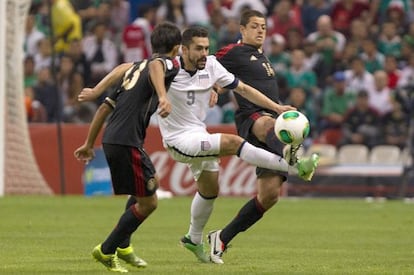North Mexico versus South Mexico
The USA’s youth soccer teams have a large Hispanic presence Some American-born players opt to represent Mexico

On Tuesday night in Mexico City's Azteca stadium the matter of least interest in a World Cup qualifier between Mexico and the USA was the dour 0-0 outcome. Games between the two nations exude something more than a chauvinist rivalry played out over their common border. In the last few years, beyond providing an excuse for Mexico to reiterate that at least in terms of soccer the power rests with them, and for the USA the satisfaction of threatening this historical superiority, these matches have become a reaffirmation of the cultural identities that separate the two banks of the Rio Grande.
Never before has the concept of a frontier been so blurred and yet so defined as in recent matches between the senior and junior national sides. On Tuesday three of the USA's best players, Omar González, Joe Corona and Hércules Gómez, could have played for the opposition. All three were born in the USA to Mexican parents who cheered the Tricolor but their sons elected to play for the Stars and Stripes.
These are the only three players in the senior side with Mexican heritage, but in the youth teams the percentage shoots up. Three weeks ago in Puebla the under-20 teams of both nations met in the Concacaf 2013 regional final, which Mexico won 3-1 in extra time. Both sides qualified for the Fifa under-20 World Cup in Turkey in July, with Mexico going into the draw as top seeds from the Concacaf zone.
In the game, USA under-20 coach and former Betis midfielder Tabaré Ramos fielded seven players of Mexican descent but with US passports. Mexico players Uvaldo Luna and Abel Fuentes could have also played for the opposition but renounced their right to wear the white shirt.
USA under-20 coach and former Betis midfielder Tabaré Ramos fielded seven players of Mexican descent but with US passports
The game was dubbed North Mexico versus South Mexico and attracted some negative Twitter coverage: "And the Americans complain about Mexicans taking their jobs..."
The US media devoted column inches to defending the patriotism of Hispanic players in the US sides and said that the betrayal was carried out by two Mexicans, in reference to Luna and Fuentes, who helped to defeat what should have been their team.
In the midst of a debate on migratory reform in the USA, the nation's soccer teams serve as a barometer to grade the level of integration or exclusion of minority nationalities in the country. Forums such as Twitter allow a watch to be kept on the acceptance of a dominant minority in the national soccer side... or otherwise. "There are ignorant people wherever you go," notes Ramos.
The US coach, born in Uruguay, plays down the demographic shift. "I don't think about where people come from, I just pick the best players." However, he says it is no coincidence that there are so many Hispanic players in the youth teams. "We Latinos are used to kicking a ball around from childhood; others find it harder. There may be players of Hispanic origin but they have all learned to play soccer in the USA. Other teams have nationalized players. Mine doesn't."
Pablo Ocegueda and Uvaldo Luna were born in the USA and grew up playing together at the Los Tigres Academy in Houston. Luna, a striker, and Ocegueda, a left back, both play for the Mexican side in the Liga MX, the country's top flight, and both play for Mexico. Although he had previously been selected for the under-17 USA side, Luna told EL PAÍS that he elected to play for Mexico "because of the quality of its soccer, so I could grow as a player." Ocegueda says that he is an American first and foremost and then he gets abuse from the stands in Mexico it makes prouder still to call himself one.
Both players are a clear example of the reality of immigration in the USA, and that has now been translated onto the soccer field: the duality between family education and the culture in which they grew up. "Nobody has reproached me for choosing to play for Mexico. All of my friends and family speak Spanish and my environment is Mexican."
The old adage that soccer is a universal language cannot be more and at the same time less the case for Hispanic players in the US. All of them grew up watching their fathers supporting other national teams and most play in Mexico but they remain faithful to the flag and the culture into which they were born.
Tu suscripción se está usando en otro dispositivo
¿Quieres añadir otro usuario a tu suscripción?
Si continúas leyendo en este dispositivo, no se podrá leer en el otro.
FlechaTu suscripción se está usando en otro dispositivo y solo puedes acceder a EL PAÍS desde un dispositivo a la vez.
Si quieres compartir tu cuenta, cambia tu suscripción a la modalidad Premium, así podrás añadir otro usuario. Cada uno accederá con su propia cuenta de email, lo que os permitirá personalizar vuestra experiencia en EL PAÍS.
¿Tienes una suscripción de empresa? Accede aquí para contratar más cuentas.
En el caso de no saber quién está usando tu cuenta, te recomendamos cambiar tu contraseña aquí.
Si decides continuar compartiendo tu cuenta, este mensaje se mostrará en tu dispositivo y en el de la otra persona que está usando tu cuenta de forma indefinida, afectando a tu experiencia de lectura. Puedes consultar aquí los términos y condiciones de la suscripción digital.









































